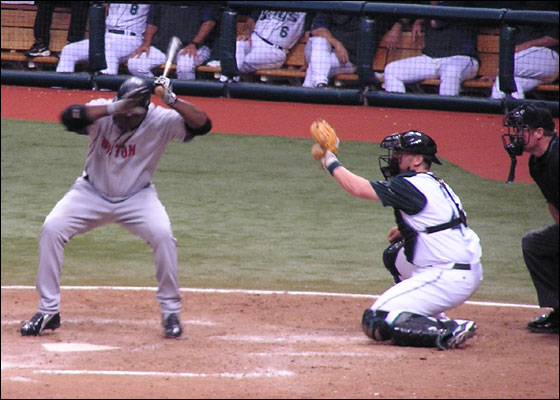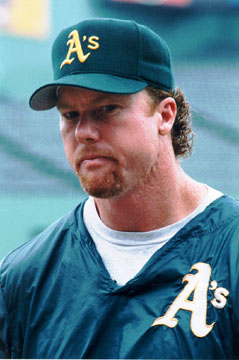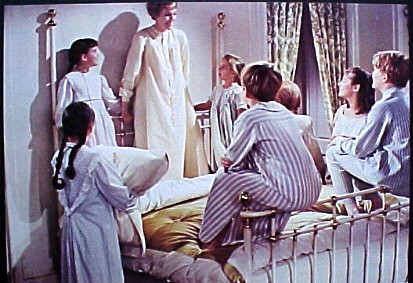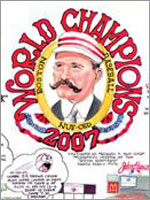
Beanballs and Birdbrains
|

|
|
(Boston Dirt Dogs Photo / 4.24.05 Bill Rubino) |
“It’s pretty
funny until the rabbit gets the shotgun.”
– John Salley
A baseball thrown at a major league
hitter at ninety miles per hour allows him about 0.4 seconds to analyze and
react. Prior to today’s action, there had been 99 batters hit by pitchers in the
National League and 101 in the American League, not a significant difference.
Judging by today’s action between the Red Sox and the Devil Rays one wouldn’t
know that.
The feud between the Red Sox and the Devil Rays goes back literally years,
although like many conflicts, few remember the origins. However, each year it
seems that the quid pro quo expands, unchecked by changes in management,
managers, and players. This weekend a series of hit batsmen again erupted in
gang warfare, culminating in an attempted drive-by hit on David Ortiz by Lance
Carter after Carter had brushed back Manny Ramirez who promptly responded by
hammering the next Carter fastball into the bleachers. Ortiz then nearly became
the victim of the purpose pitch, the purpose “being to separate the head
from the shoulders.”
During the Red Sox pennant quest of
August 1967, Angel righthander Jack Hamilton beaned budding superstar right
fielder Tony Conigliaro, causing severe eye injuries, beginning the downward
spiral of Conigliaro’s career. Neither Carter nor Ortiz were born then, and
perhaps neither is aware of Conigliaro’s significance to Red Sox history.
However, all those of us who remember that nightmare never wish to recall it or
see another Boston or opposing player in similar circumstances.
Although the designated hitter rule has become the focus for the problem of
beanball wars, it’s not so simple. Pitchers need to use both sides of the plate
against today’s bigger, stronger hitters and hitters diving in on the plate need
to understand that every inside pitch is not a ‘purpose pitch’. On the other
hand, when intent is clear and contempt not control becomes the issue,
major league baseball needs to act with clarity and immediacy.
The pitchers involved, management,
and managers should be severely reprimanded, suspended and fined. There should
be no warning and no appeals. The umpiring crew involved should be suspended for
one series without pay for failing to control the game. Both the Red Sox and the
Tampa management should be fined a minimum of $250,000 dollars, both managers and
pitchers suspended for a minimum of ten days, and Bud Selig should contact every
team and assure them that this is the end, not the beginning of the zero
tolerance policy to a baseball tradition that must end now.
Will that happen? Of course not,
because the “labor unions” will prevent harsh treatment of their coddled
members. The idiocy will continue and baseball machismo will manufacture more
manure, while the action serves up post-game highlights and ESPN moments. Maybe
NESN can have a ‘beanballs and birdbrains’ segment.
- Ron Sen, Boston Dirt Dogs (Check out Ron's
most excellent new blog
Red Sox Reality Check)
McGwire, Statistics, and the Long Bawl
|

|
|
(Boston Dirt Dogs Photo/Bill Chapman) |
“There’s no crying in baseball.”
–- A League of Their Own
Mark McGwire’s tear-splashed testimony to Congress moved me to research some baseball statistics. After all, we love to talk about ‘magic numbers’, 755 or 714, 20 game winners, .300 hitters, and of course, million dollar crybabies.
Many factors contribute to the explosion of home runs in baseball over the past decade – equipment (live ball), park effects (smaller), pitching (worse), strike zone size (smaller), and player effects (weight training, steroids). Can we try to measure the effects on home run production by top sluggers? I believe that we should frame our argument in terms of peak performance relative to early average performance and expect the effects to be maximized among elite players. That is not to say that the effects wouldn’t be more widespread, just easier to detect in ‘All-Star’ caliber players than in reserves, let’s say for example Manny Alexander.
First, we can look back in time (mid-sixties for example) to assess overall homer production. In 1965, there were 2688 home runs in MLB, 2743 in 1966, 2299 in 1967, and in ‘The Year of the Pitcher’ 1968 only 1995. That works out to 2431 homers per year or about 121 per team in ten team leagues. Admittedly, the Koufaxes, Gibsons, Marichals, and Jenkins of the time had something to do with that. On the other hand, Aaron, Mays, Frank Robinson, Mantle, and Killebrew headed up the offense.
From 2000 to 2003, the totals were 5693, 5458, 5059, and 5207 or 5354 per season, and 178 per team (16 National League teams, 14 American League teams).
I decided to look at the top ten home run hitters prior to 1992 and compare them with the top ten contemporary sluggers (career homers) and compare their peak home run production to their average homer production during their first five full seasons (defined by qualification for batting title by plate appearances). One might expect comparable output early in their careers (averaged). We also have to remember the differentials in games played (154 versus 162), which if anything might diminish the difference between prior and current eras.
This type of analysis looks for trends, but obviously cannot distinguish which players may have ‘cheated’ or adapted to changes in professional baseball (wink, wink, nod, nod). We know that in previous eras, performance-enhancing drugs were not available to players, and a number of players, specifically Ruth and Mantle, frequently indulging in performance-detracting drugs (alcohol).
|
Pre-1992
|
Five full seasons
|
Peak
|
Ratio
|
|
Aaron
|
140
(28)
|
47
|
1.68
|
|
Ruth
|
218
(43)
|
60
|
1.38
|
|
Mays
|
183
(36)
|
52
|
1.42
|
|
F.
Robinson
|
165
(33)
|
49
|
1.48
|
|
Killebrew
|
212
(42)
|
49
|
1.16
|
|
R.
Jackson
|
159
(32)
|
47
|
1.48
|
|
Schmidt
|
171
(34)
|
48
|
1.4
|
|
Mantle
|
160
(32)
|
54
|
1.69
|
|
Foxx
|
206
(41)
|
58
|
1.41
|
|
T.
Williams
|
165
(33)
|
43
|
1.30
|
|
Post-1992
|
Five full seasons
|
Peak
|
Ratio
|
|
Bonds
|
126
(25)
|
73
|
2.90
|
|
McGwire
|
175
(35)
|
70
|
2
|
|
Sosa
|
149
(30)
|
66
|
2.21
|
|
Palmeiro
|
78
(16)
|
47
|
3.01
|
|
Griffey
|
132
(26)
|
56
|
2.12
|
|
McGriff
|
171
(34)
|
37
|
1.08
|
|
Canseco
|
187
(37)
|
46
|
1.23
|
|
Bagwell
|
113
(23)
|
47
|
2.06
|
|
F.
Thomas
|
175
(35)
|
43
|
1.23
|
|
J.
Gonzalez
|
162
(32)
|
47
|
1.45
|
What does this type of analysis tell us? We know that according to Mark Twain, ‘there are three kinds of lies – lies, damned lies, and statistics.” The data contained above doesn’t normalize the performance to age (Ken Griffey had his first full season at age 19, while Henry Aaron was the ripe old age of 20). It excludes ballpark effects (Aaron’s peak homer season came at Atlanta’s ‘launching pad) and differences in player development over time. Without being statisticians, at a glance, we can see the top six differences in production come from contemporary players.
For the entire group of old-time Hall of Fame sluggers, the ratio of their peak output to first five-year average was 1.51 peak/ average homers. For the contemporary sluggers (note Jose Canseco is not among the leaders), the ratio is 1.78, almost 20 percent higher. The mean batting average has largely clustered around .260 since its inception. In most systems, as discussed elsewhere, collective excellence generally reduces the standard deviation of performance. In other words, as overall performance improves, the distance between outsized performance and the average usually narrows. Concerning home run hitting, maximum performance particularly with advancing age (relative to early mean performance seems implausible).
For interest sake, looking at some other Red Sox sluggers with over 300 homers, Carl Yastrzemski checked in at 2.78 (all that weight training at the Colonial?), Dwight Evans scored 1.53, Jim Rice was at 1.35, Manny Ramirez is at 1.26, and Carlton Fisk was at 1.67.
Then there’s the ‘wassup’ 1996 career of Brady Anderson, who using my criteria checks in at 2.28, with his monster season of 50 homers. Anderson had never hit more than 21 homers in a season, and had never had a slugging percentage of over .449 prior to slugging .637 that season. He never slugged over .480 again. What did change was that his salary jumped from $3.33 million in 1995 to over $7 million by 2000. I don’t know if there has ever been such a performance disparity in the history of baseball. What explains it? We’ll never know. There’s no use crying about it now.
- Ron Sen, Boston Dirt Dogs
Taking Names
We like beer flat as can be.
We like our dogs with mustard and relish.
We got a great pitcher what's his name.
Well we can't even spell it.
We don't worry about the pennant much.
We just like to see the boys hit it deep.
There's nothing like the view from the cheap seats.
-- Cheap Seats, by Alabama
Congress has subpoenaed Major League Baseball players, union officials, and executives to testify before it next week in an inquiry into professional baseball’s use of illegal performance-enhancing drugs. Reminds me of a headline I saw in a Boston paper over 20 years ago ’21 Month Investigation Reveals Flourishing Sex Scandal in Combat Zone.’ Which part was surprising, the scandal or that it took 21 months to unearth it? “Well, Jake, so you needed thirty-six trips to the Two O’clock Lounge to discover this?”
Sure, the term ‘tape measure homer’ didn’t originate in the nineties, but when slap hitters like Brady Anderson hit 50 homers, it does make you wonder, unless of course you are part of the baseball establishment. We won’t be hearing ‘returning Jeopardy champion’ and Bud Selig in the same sentence after this one. Maybe that’s why Tommy LaSorda says, “there are three kinds of people, those who make things happen, those who watch things happen, and those who wonder what’s happening.”
Still, we at Dirt Dogs think positively. Remember, legend has it that the Chinese character for crisis comes from the combination of danger and opportunity. Congressional testimony offers MLB players and officials unprecedented access to the launching pad into politics. After all, you can’t take steroids, er, play baseball, forever. Many athletes and executives have crossed the sports Rubicon and entered politics- George Bush, Sr. the Eli first baseman, Ronald Reagan, ‘The Gipper’, Kentucky Senator pitcher Jim Bunning, Oklahoma quarterback Congressman J.C. Watts, Bills quarterback Jack Kemp, Minnesota Governor wrassler Jesse Ventura, Seahawk receiver Congressman Steve Largent and Iowa Congressman Fred Grandy. Well, actually Grandy was Gopher, the Purser on The Love Boat, but he was known for playing games.
Local hero Curt Schilling and other baseball notables will have the chance of a lifetime to trot out popular clichés like the Schultzian ‘I know nothing’, ‘I have no specific recollection of that’, ‘I can’t recall that’, and ‘you know the answer to that better than I, Congressman’. I’m St. Patrick’s Day green with envy.
Dirt Dogs also reminds the baseball emissaries about some general Washington principles. Having spent ten of my formative years at Bethesda Naval Hospital, I had the privilege of examining some Washington dignitaries subjected to the fickle finger of fate, so to speak. First, ‘knowledge is power’ 535 (or more) men and women on the Hill believe that they have the knowledge to compete for the Big Chair. They lust after the power, and dog and pony shows are one means to that end. Second, ‘never ask a question that you don’t know the answer to’. If you get some surprise answer, that could require some quick and embarrassing follow-up. For example, “Well, Mr. Fritz Peterson, how do you and Mr. Kekich get along off the field?” Most important, remember the prime directive of Washington, the two most important words in on Capitol Hill, “plausible deniability”. “Mr. Baseball, you’ve lost 75 pounds since you’ve left the game, and gone from a size 19 neck to a size 16. How do you explain that?” “That’s easy Congressman, since I don’t make fifteen million dollars a year anymore, I don’t eat out as much and I’m on the Atkins Diet.” “Thank you Mr. Baseball.”
When I taught young physicians and medical students, I emphasized the two best answers in medicine: 1) “I don’t know” and 2) “that’s a good idea, we should have done that”. For all baseball’s faults, I expect that’s the tack they’ll pursue. One line we won’t be hearing, “you have nothing to fear but Fehr himself.” You want to watch real hardball, stay tuned to the hearings. Congress is just starting to take names.
- Ron Sen, Boston Dirt Dogs
Just Do It
Boston Dirt
Dogs supports a level playing field. Nobody can justify a chemical or
physiologic advantage for the opposition, e.g. the New York ‘drug-enhanced’
Yankees, even notwithstanding their ethereal apologies. The Red Sox and the
rest of Major League Baseball also deserve the opportunity to achieve
maximum human performance.
Therefore, I
propose alternatives. Just a few minor tweaks to enhance fan enjoyment.
First, expansion to a new ‘no testing’ MLB. Bring your chemist. Andro? Mark
McGwire, you are our American Idle. Anabolic steroids? Wonderful. Afraid of
needles? No problem, we’ve got BALCO hard at work on that one. Human growth
hormone? We’re about growth, baby. Blood doping? No way, Jose. There are
enough dopes in baseball already. Amphetamines? That’s so sixties. What
about beta-blocker withdrawal? Probably wouldn’t help to go up to the plate
with a tremor, but pitchers could explain their wildness.
While we’re
at it, choose your weapon, wood, corked or uncorked, and of course aluminum
alloy. In memory of Wally Joyner, let’s bring back the juiced ball, too.
Chicks dig the long ball. We want scoring. Move the fences in, chop down the
Monster and put in ‘outfield box seats’ (it’s the Benjamins), and lower the
mound. Rename it the ‘bump’, three inches. Narrow the width of home plate,
and move the bases in five feet, so we can have more infield hits and even
gargantuan sluggers can go from first to third.
Synthetic
turf becomes mandatory. Anyone caught pretreating baseballs in the freezer
would be subjected to felony charges. God forbid anyone tamper with our
rights to see four-hour baseball games with football scores. Glove sizes
would be rolled back to the thirties, and fielders would be required to wear
hiking boots.
Still not
enough for you? How about permitting a designated hitter free substitution
once a game? David Ortiz can fly out to end the eighth, and be allowed to
bat again in the ninth. Relief pitchers wouldn’t be allowed to warm up in
the bullpen (just after they’re called in) and defensive replacements are
disallowed (Sorry Pokey).
Now I know
that you’re reminded of those wacky MIT students in Bringing Down the House
beating Vegas at their own game, and how they didn’t change the structure of
the game, just how they played it. Of course, times change and maybe Bonds
and Giambi will make us forget Frank, Robby, Killebrew, Mantle, Mays, and
Aaron. They’re remembered for what they did, while many of today’s stars
will be remembered more for how they did it.
- Ron Sen, Boston Dirt Dogs
The Sound of Fenway
(to the tune of ‘My Favorite Things’)
|

|
We give no trade clauses with free
agent signing,
The World Series trophy is ours no more whining,
Bullpen with Foulke, no fear of late innings,
These are a few of my favorite things.
On base percentage to fill Bill James’ doodles,
we won’t have our hitters with bats like wet noodles
Four pitches per at bat no more first pitch swings
These are a few of my favorite things.
Damon with power and stolen base dashes,
Manny and Ortiz with their homerun smashes,
No more ‘1918’ heard in Florida springs,
These are a few of my favorite things.
When the Sox lose, when the scribe stings,
when I'm feeling sad,
I simply remember my favorite things,
and then I don't feel so bad.
Pitchers with cornrows and batters with whiskers,
Fenway Park ushers who now have to frisk us,
Admission price has become cheap for kings,
these are a few of my favorite things.
Even more seating and luxury boxes,
Signage and scoreboards and aisles filled with hawkers.
Cold beer and hot dogs with buffalo wings,
these are a few of my favorite things.
Schilling addresses and Francona pep talks,
Lineups with power but also that take walks,
Hot stove league winters that melt into springs,
these are a few of my favorite things.
When the Yanks win, when Roseanne sings,
when I'm feeling sad,
I simply remember 2004,
and then I don't feel so bad.
- Ron Sen, Boston Dirt Dogs
Quote Machine
Professional athletes tend to be long on
clichés and short on candor. So, in the Christmas spirit, and with the Red Sox
free agents rich, departed, or both, inspired by ‘Liar, Liar’ I’ll offer up some
quotes as Christmas gifts. As they say, ‘there is nothing cheaper than free
advice.”
For Pedro Martinez: “I’m a legend and my career is extended in the NL. I wasn’t going to settle for a dime less than I could get. I’m happy that I took the money. People take the job that offers the most money every day. Be happy for me.”
For Derek Lowe (see Pedro Martinez): “Hey, I won three big ones in the post-season. I’m going to take the most money, whoever offers it. Pay ‘The Man.”
For Curt Schilling: “I’m friggin’ Diogenes with the lamp. I guess I won’t be hearing any of that 1-B stuff anymore, right?”
For Keith Foulke: “When are the Bruins going to start playing again?”
For Bronson Arroyo: “So I had a bad hair year. I hope it’s not ‘hair today, gone tomorrow.”
For Tim Wakefield (smiling): “I knew that if we won the series they’d name a town after me.”
For John Halama: “It’s going to be great to be going back to Tropicana Park as the opposition for a change.”
For Free Agent Signee (fill in the blank here): “Not only am I excited to play in America’s Most Beloved Ballpark, I am very excited about the generosity of the team in paying me a king’s ransom.”
For Jason Varitek (after being named Captain): “Scott, that wasn’t in the contract!”
For Doug Mirabelli: “You mean there’s a chance that Wakefield won’t be pitching every fifth day? Yippee!”
For David Ortiz: “Do I take steroids? Look at this body.”
For Doug Mientkiewiecz: “If they trade Millar, I’ll change my name legally to ‘Minky’, honest.”
For Mark Bellhorn: “I keep telling Theo that I’ve got the highest Win Shares to salary ratio on the planet, except for maybe Rich Harden. Paging Bill James.”
For Edgar Renteria: “What a country!”
For Bill Mueller: “Are you kidding me? They better trade Kevin or we’re over the two Miller limit.”
For Kevin Youkilis: “I don’t feel like a Greek God.”
For Manny Ramirez: “Compared to Mike Greenwell, I look like Paul Blair in the outfield. Ask Miguel Cairo if he’s finished the home run trot, yet?”
For Johnny Damon: “Cutoff man? What cutoff man? No cutoff, man.”
For Jay Payton: “It figures they get me after they get rid of my buddy, Nomar.”
For Trot Nixon: “Do I like to hit lefthanders? I just sent Javier Vazquez a Christmas present for keeping RJ in the National League.”
For Scott Boras (laughing hysterically): “Who’s the fairest of them all? Oh you are indeed, Scott. Ka-ching! Ka-ching! Ka-ching!”
For Tito Francona: “Any chance for a renegotiation, Theo?”
For Bill James: “You can’t tell everything about the player by his numbers, for example, his eye color.”
For Larry Lucchino: “George Steinbrenner can kiss my…”
For Theo Epstein: “About that left nut thing…”
For gazillionaire John Henry: “I hope this is the beginning of a trend.”
…and to all a good night…Happy Holidays! -- Ron Sen, Boston Dirt Dogs
Power Play?
The departure of Pedro Martinez has
empowered the common man. Teachers, nurses, engineers, dockworkers, chefs, and
sports journalists understand they deserve the love and the respect of their
employers. I work in a hospital. Today, a nurse, I’ll call him ‘Mark Tinnes’
listed the demands that he will present to his boss, the hospital CEO, on
Monday. I encouraged him to go for it.
Mark explained that his ability is State of the Art. He is simply the best.
Recently he won the Hospital Employee of the Month. Proof enough. Accordingly,
he expects the highest compensation of any nurse in the hospital. To Mark, pay
for performance is not discretionary, it shows the hospital respects and values
him as a person not just an employee. Mark gets hungry like everyone else. He
needs meal money, at least $76.50 a day to get decent food around here. Mark
also needs transportation to the hospital. He’s willing to accept a car
allowance and gasoline money. Paragon of virtue aptly describes him.
Working conditions must improve. As the consummate professional, Mark expressed
a willingness to work every fourth day. He knows that some practitioners of the
craft only have to work every fifth, but he’s always about effort. He’s willing
to show up every day during the flu season. Sure, often he’s only at his best
through the sixth or seventh hour of work, but he says that’s better than most
of his peers.
He can’t accept ‘floating’ to other units in the hospital. Were he to accept
this, he requires a suite where he could be comfortable. He won’t work ‘off’
shifts either. That would compromise his performance. In fact, the concept of
shifts is an anathema. No one can expect a professional to come at a certain
time and stay until a certain time. If you want excellence, understand it comes
at a price.
Nursing places a lot of demands on an individual. You can’t expect Mark to work
every other weekend and every other holiday. He also expects a four-month
off-season to help him recover from the grind of medicine. If he needs a
vacation, he may need an extra day at the beginning and the end. His commute is
pretty long.
Mark won’t be precepting any junior employees, either. They have to learn it the
hard way just like he did.
Mark enjoys excellent health. He absolutely refuses to consent to any employment
physicals, drug testing, or especially an MRI. He won’t be poked and prodded
like a piece of meat. Of course, he understands that he’ll be receiving constant
performance evaluation from his supervisors and patients. But he also knows that
his union assures guaranteed pay, regardless of whether his performance declines
or if he becomes sick or injured.
Mark knows that ownership, especially the CEO, care deeply about him. He has no
problem with them. He has concerns, however, that middle management, like his
nursing supervisor, are solely puppets of the organization. They have an agenda
to bring key players like Mark down. Mark won’t have any part of that
interference with his professionalism.
Mark’s business is with the patients and the doctors. He can’t be talking with
the patients’ families or friends either. That’s understood in the new contract
terms.
I thanked Mark for his insight into the problems he faces daily. He told me he
felt pretty confident that with the nursing shortage that the CEO would be
receptive. After all it’s about life and death.
What’s the phone number for the AMA office anyway?
-- Ron Sen, Boston Dirt Dogs
Why?
In a moment the ashes are made,
but the forest is a long time growing
-Seneca
Steven Covey, author of Seven
Habits of Highly Effective People, tells us ‘the hardest thing to do in life
is to understand how someone else thinks.” While we reflect on the barbs of
rejection tossed our way by Pedro Martinez, maybe we can learn something from
the experience.
Studies pioneered by Kahnemann and
Tversky examined how people make decisions concerning risk and loss. They showed
that people focus on anchors (a dependence on current conditions) and loss
aversion (avoiding the pain of loss). We know the power of herd behavior and
know the importance of conditioning (learned experience on behavior). Be
patient, this is the foundation.
I recall an interview with the late
Sonny Bono (the singer, not the U2 guy) who had an oversized refrigerator
stuffed with food at all times. He remembered his childhood poverty and how
often he was hungry, and needed the security of his refrigerator. Although a
beautiful country with friendly people, the Dominican Republic has widespread
poverty. A bus tour reveals neighborhoods with tiny homes of corrugated tin with
holes cut out for windows and doors. Iron bars on windows and doors protect many
properties with valuables. The security industry has a prominent face on the
island. I don’t suggest that the Dominicans aren’t honest, rather that the
temptations of poverty and the need to survive are great for their poorest
citizens.
We focus on our anchors, the
Red Sox, World Series Champions, and frown at the loss of a
high-maintenance but extremely talented pitcher, Pedro. Professional baseball
owners and general managers exhibit herd behavior, overpaying for past
performance, to secure players’ future performance. This often results in
‘the winner’s curse’ also known as buyers’ remorse.
What does Pedro Martinez focus on? I
can only speculate that growing up with very little, overcoming an
astronomically high pyramid to achieve professional baseball success, and
performing at a high level for years created a man of immense pride and extreme
ego. This allows him to demand and receive special treatment, vacations and
perks not available to his teammates. Curt Schilling mentioned the pressures of
providing for an extended family. Although Pedro probably feels powerful and
entitled to every last dollar, simultaneously he walks in the dark shadows of
insecurity concerning fragile health and performance. “I just tip my hat and
call the Yankees, my daddy.”
Moving to New York potentially
accomplishes a lot for Pedro. First, he gets the maximum guaranteed money,
security beyond our wildest dreams. People in many professions make that choice
every day. Second, he returns to the National League, absent the DH and
generally accepted as offensively inferior to the AL. Third, he escapes the
frequent confrontation with his master, the Yankees.
What does he lose by going to New
York? Realistically, although he will have pressure to perform for the dollars,
Pedro isn’t likely to single-handedly turn around the mediocrity there. He will
certainly generate some additional interest (fannies in the seats) and the Mets
can probably space out his starts to capitalize on that and get him the extra
rest that improves his performance. He may not win as often as he did in Boston,
but he has not only the statistics, the Cy Young Awards, and the championship
ring to validate his greatness.
Can we really get inside another
man’s head? Maybe not. Pedro’s needs belong to Pedro. “As the twig is bent,
so grows the tree.”
More 2005 20/20 Archives
More 20/20 Archives


















